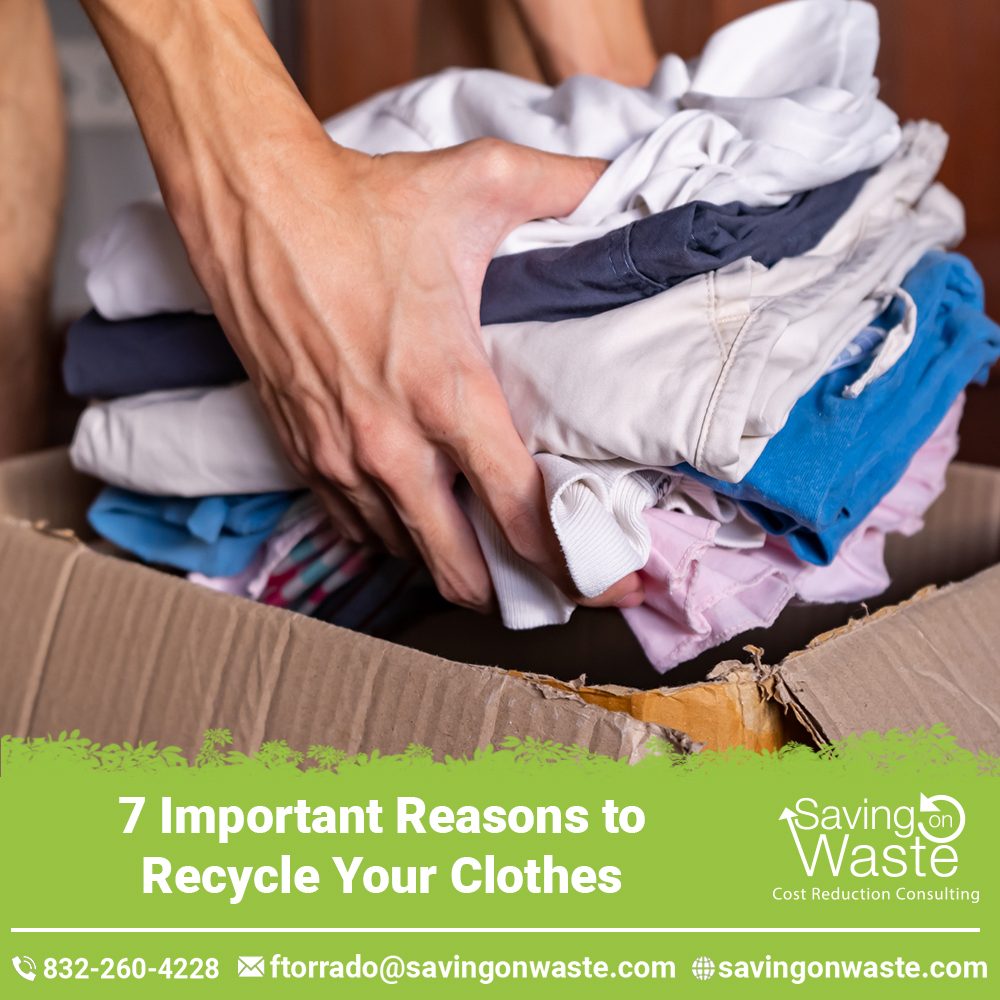
7 Important Reasons to Recycle Your Clothes
Reduce, reuse, recycle—we’ve all had this ingrained in our heads for years. We make sure to toss the plastic bottle in the blue bin, but reusing and recycling play a bigger role than in just the plastic and paper industry. In fact, the textile industry is equally important for recycling. People shop more and buy more, so the output for clothes is greater. But this fast fashion industry and these overstuffed closets have all led to overflowing landfills.
Maybe your new year’s resolution was to make more eco-friendly choices, or maybe you know you need to pare down your closet, but you’re not sure what to do with the clothes afterward. Before you throw unwanted clothes in the trash, consider the ramifications of adding to the landfill versus textile recycling. Below, we’ll delve into some of the most important reasons to recycle your clothes. From avoiding the landfill to limiting unethical business practices, textile recycling should come just as naturally as tossing paper in a blue bin.
- It Makes a Mark on Statistics
Textile recycling makes a big impact on some scary statistics. One of the best ways to transition to constant clothing recycling is by learning about the impact it can make. In hopes to provide more information on why it’s important to recycle your clothes, we’ve outlined a few of these statistics below.
- The following statistics are according to the EPA’s 2017 Data tables on Advancing Sustainable Materials Management, “more than 139 million tons of municipal solid waste (52.1 percent) were landfilled.”
- “The recycling rate for all textiles was 15.2 percent in 2017, with 2.6 million tons recycled.” This is a significant increase from even ten years ago.
- In 2017, 16,890 tons of textiles were generated—only 2,570 tons were recycled, and 11,150 tons were landfilled.
- It Reduces Greenhouse Gases
Clothing made from organic materials (cotton, linen) should be biodegradable. However, when people toss out clothes and they end up in landfills, those clothes lack the oxygen needed for organic materials to break down. Lack of oxygen leads to decomposition through anaerobic digestion, which means that microorganisms break down the organic manner, producing byproducts like methane. Produced consistently and uncontrollably, methane escapes into the atmosphere, harming our air quality and our planet.
- It Saves Landfill Space
When we don’t toss our clothes in the trash, and they don’t end up in the landfill, so we’re saving loads of space. Landfills are harmful in a variety of ways, impacting not only our environment but also municipal budgets and the health of entire communities. As the statistics showed, 11,150 tons of textiles were landfilled in 2017. That’s tons of space that could have been used for something much more beneficial for the environment. When we recycle clothes and other items, we play a part in reducing landfill costs for cities, which increases the budget for other important city needs.
- It Helps Those in Need
Probably the main reason people choose to recycle clothes is that it helps people in need. For example, when you donate to GreenDrop, you can support four different organizations—the Military Order of the Purple Heart, the American Red Cross, the National Federation of the Blind, and the Society of St. Vincent de Paul of Philadelphia. Your clothes are turned into monetary donations to help those organizations. But donated clothes are also often sold to thrift shops or even sent to developing countries. When you recycle clothing, your aid is widespread.
- It Reduces Costly Consumerism
For the past few years, people have been raving over the idea of living a minimalist lifestyle. Though it’s not for everybody, the idea of living on less is an important ideal, especially when in reference to consumerism. Materialism does not lead to happiness, and when people recognize that, one of the first things to go is clothing. People purge their closets and shop less—the minimal lifestyle prevents us from participating in costly consumerism, or more importantly, costly waste. When we buy recycled clothing, recycle clothing ourselves, and simply buy less, we’re making a personal impact on the wastefulness and costliness of the textile industry.
- It Conserves Vital Energy
The process of producing clothing uses a high amount of energy. Every piece of clothing you’re wearing has gone through a complex manufacturing process that uses a high amount of electricity, water, and other energy sources. Recycling clothes saves energy by reducing or eliminating the need to make materials from scratch. Similarly, when you purchase recycled clothes, you’re playing a role in reducing the volume of “fast fashion”.
- It’s Simple
Probably one of the most important reasons to recycle your clothes is how simple it is. Donating your clothes takes only a few seconds more than it does to toss them in the trash. When you think about how much you’re helping the planet when you recycle, it makes it even easier to drive and drop off the clothes or set up a donation pick-up. Better yet, when you partner with GreenDrop, we make it even more simple! All you need to do is pack the clothes in bags or boxes and schedule clothing donation pick-up. We’ll head to your home and take the clothes away—it’s hardly any effort on your part and helps the environment and those in need.
- Best Ways to Recycle Clothing
- Donate your unwanted garments! As we’ve said, it’s a simple way to recycle that helps both the environment, those in need, and yourself.
- Turn old clothing into cleaning rags. Cut the clothes and turn them into rags for dusting and cleaning. It’ll help you save money, keep your home clean, and reuse items you were going to toss in the trash.
- Use them for crafting purposes, and if you’re not a crafter, lend the items to someone you know who is.
- Look up other textile recycling programs. For example, Nike has a Reuse-A-Shoe program where they’ll take worn-out athletic shoes, grind them up, and use them to create playgrounds, courts, and more.
- See if the clothes can be composted. Items that are 100 percent cotton can be composted—shred them finely, remove any attachments, and add it to your compost pile.
Source:Gogreendrop
Saving on Waste is a cost reduction consultant company. Our main office is in Houston, TX but we can work in all of The United States. We would work for you, the client, and always have in mind your needs and try to maximize savings.

Best Trash Services In Houston
Waste Hauler in Houston TX, Waste Collections in Houston TX, Waste Consultant, Trash Services, Trash Collection, Trash Pickup Services, Trash Reduction, Dumpster Collection ServicesSaving on Waste

